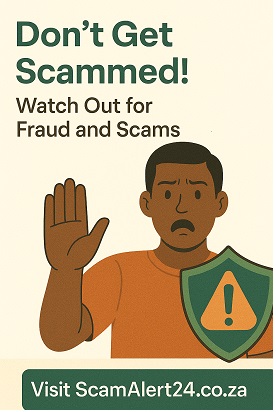1. What Is ScamAlert24.co.za?
ScamAlert24.co.za is a South African online platform dedicated to exposing and explaining scams targeting South African individuals and businesses. The site publishes real-world scam alerts, break-downs of fraudulent tactics, and practical guidance to help readers detect and avoid social engineering, phishing, fake tenders, and recruitment fraud.
2. Core Features & Content
Scam Reports & Case Studies
- The site regularly publishes in-depth breakdowns of scam campaigns, including impersonations of government departments. For example:
- A fraudulent RFQ targeting businesses impersonating the Department of Correctional Services (DCS) using fake identities like James Nampala or Pieter Bezuidenhout tied to “Tender No. HO02/2025” or “PLMT 24‑25‑07” with urgent response deadlines and suspicious email domains Reddit+15ScamAlert24+15ScamAlert24+15.
- A fake DCS RFQ offering wireless fire alarm systems without official documentation or proper channels, steering businesses toward fake suppliers ScamAlert24+3ScamAlert24+3ScamAlert24+3.
- A bogus RFQ from the Department of Human Settlements using linda.mangena@dhs‑sa.online to urge suppliers to outsource goods within 3 working days—a red flag tactic ScamAlert24+2ScamAlert24+2ScamAlert24+2.
Informational Guides
- The site publishes useful educational content like “How to Spot and Avoid Banking Scams,” covering phishing calls, fake bank alerts, SIM-swap fraud, extortion emails, and hints on safe password practices and OTP safeguards Reddit+15ScamAlert24+15ScamAlert24+15.
3. Target Audience & Purpose
ScamAlert24 serves multiple audiences:
- Entrepreneurs and suppliers—especially procurement teams—in South Africa needing to vet suspicious RFQs, tenders, or supplier emails.
- Consumers and vulnerable youth—to understand frequently used scams such as fake job schemes or urgent payment requests.
- General public—educating on cybersecurity hygiene and how scammers manipulate fear and urgency to trick victims.
4. Examples of Scam Types Covered
Tender & Procurement Scams
- Emails mimicking DCS or SACAA geared toward procurement fraud. Common tactics include urgent RFQs, outsourced supplier directions, and obscure email domains. Legitimate tenders are never submitted without listing on the official eTenders portal and proper references Reddit+12ScamAlert24+12ScamAlert24+12.
Job & Training Cons Scams
- Fraudulent traffic officer training schemes demanding payment of R500–R1,000 for training or transport—for positions that don’t exist. Victims end up stranded and out of pocket. The North West Department officially warns against such schemes, reminding that government recruitment doesn’t ask for fees ScamAlert24.
Financial & Phishing Scams
- Alerts on phishing attempts posing as banks, emails warning of fake threats, # of breaches, or extortion demands. The content guides readers on verifying legitimacy, using secure logins, and not disclosing OTPs or credentials via nonsanctioned channels ScamAlert24.
5. Educational Value & Practical Advice
ScamAlert24 offers readers clear frameworks to identify fraud:
- Look for odd email domains—any domain not ending in .gov.za is suspicious in government-related communication ScamAlert24.
- Watch for messages encouraging outsourcing or urging you to act fast without clarity—classic scam tactics deployed to evade rational verification ScamAlert24ScamAlert24ScamAlert24.
- Legitimate tenders appear on government portals like etenders.gov.za; absence on these portals is a red flag.
- Never respond to unsolicited requests for personal or company documents (e.g. ID copies, banking details, BEE certificates) without proper verification ScamAlert24+2ScamAlert24+2ScamAlert24+2.
6. Tone & Credibility
ScamAlert24 uses a clear, factual tone—breaking down each scam with visuals, email excerpts, domain comparisons, and step-by-step logical red flags. While it isn’t an official government entity, it references official verification sources such as eTenders portals and departmental websites. Each piece ends with call‑to‑action guidance: “Don’t respond,” “Report to government channels,” and “Verify first.”
7. Strengths & What Makes ScamAlert24 Valuable
| Strength | Description |
|---|---|
| Real, recent case studies | Actual scam emails with dates, sender details, and narrative – e.g. May and June 2025 examples ScamAlert24 |
| Sector-specific coverage | Alerts tailored to tender scams, job scams, and banking fraud specific to South Africa |
| Actionable guidance | Clear steps on verification, reporting (e.g. tenderfraud@treasury.gov.za), and avoidance strategies |
| Regular updates | Content includes alerts posted within weeks of discovery, showing active monitoring |
8. Limitations & Cautions
- Not an enforcement body: ScamAlert24 collates and shares warnings but does not investigate or arrest scammers.
- No public user comments: Unlike some forums, there’s no user-generated reports or verification system visible on site.
- Narrower focus: Primarily oriented toward business procurement scams and youth job schemes. Less coverage of everyday consumer scams like dating or investment fraud.
- Verify independently: Users should cross-reference alerts with official government channels or through direct contact with named departments.
9. How Users Should Use It
- Scan recent warnings to see if you’ve received similar messages.
- Cross-reference key details, like tender numbers or email senders, using official portals like etenders.gov.za or department directories.
- Follow their red-flag guide—spot urgency tactics, lookalike emails, outsourcing instructions, and mismatched contact info.
- Report the scam using provided official email addresses (e.g. treasury tenderfraud, SAPS cybercrime, DCS fraud lines) and encourage others to do the same.
- Share awareness, especially with small businesses, suppliers, and young job seekers who may lack institutional verification channels.
10. Final Thoughts
ScamAlert24.co.za plays a vital informational role in South Africa’s fraud prevention landscape. By documenting real scam campaigns and offering clear guidance on avoiding procurement, banking, or job lure fraud, it raises national vigilance through education.
While it doesn’t replace official reporting or enforcement, it helps users navigate deceptive tactics and verify suspicious communications—encouraging safer behaviour and informed scepticism in an age of increasing cyber manipulation.

Leave a Reply